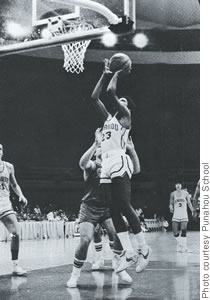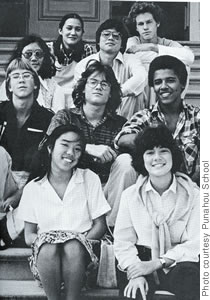‘08: Year of Obama
Growing up in Hawaii helped make Barack Obama a citizen of the world, with an outlook unlike any other presidential candidate running in ‘08

By .(JavaScript must be enabled to view this email address)
E-mail this story | Print this page | Archive | RSS |
 Del.icio.us
Del.icio.us
|
late in 1960. On Aug. 4, 1961, Ann gave birth to Barack Hussein Obama Jr.
The marriage didn’t last. In 1963, the elder Obama received a scholarship for graduate study at Harvard University. He made vague promises about coming back for the family, about calling for them to join him. He never did. The following year Ann Dunham filed for divorce.
Soon thereafter, Dunham married Lolo Soetoro, a University of Hawaii foreign student from Indonesia majoring in geography. The marriage produced a daughter, Maya.
Political instability in Indonesia resulted in many of its scholarship students abroad being called home before they had finished their degrees. Lolo Soetoro was among them. Barack, sister Maya and their mother followed him to Indonesia in 1967.
From ages 6 to 10, Barack attended school in Indonesia’s capital of Jakarta. Recently - to much derision from conservatives and some of his Democratic rivals - Obama cited those years as important to his foreign policy expertise. “I learned how to eat small green chili peppers raw with dinner (plenty of rice), and away from the dinner table I was introduced to dog meat (tough), snake meat (tougher) and roasted grasshopper (crunchy),” he wrote in his 1995 memoir Dreams from My Father.
More important, beggars at the Soetoros’ door taught him about Third World poverty; and step-father Lolo Soetoro told him stories of gross inhumanity by those who exploited the weak and the poor. In Dreams from My Father, Obama wrote: “The world was violent, I was learning, unpredictable and often cruel.”
So cruel that in 1971 Ann Dunham Soetoro - her second marriage beginning to fray - brought her son back to Hawaii to live with his grandparents and attend Punahou School. She returned to Indonesia where she would continue a career in rural development that would take her to Ghana, India, Thailand, Indonesia, Nepal and Bangladesh. “My mother was an idealist who took action,” says Maya Soetoro-Ng. “She wanted to remedy the world’s poverty and injustice.”
Young Barack lived with grandparents Stanley and Madelyn Dunham in a modest two-bedroom condominium apartment. Madelyn Dunham worked at the Bank of Hawaii, where - with little more than a high school education - she would rise from a teller’s position to become a vice president in charge of escrow.
“I tell women-for-Obama groups that the strong women - my mother and grandmother - who reared him are what makes Barack a feminist,” says sister Maya. “My grandmother defied the odds, becoming the first woman vice president in the history of Bank of Hawaii. She took care of the family financially, making it possible for Barack and me to maneuver through life, knowing that we could take some risks because she provided us a safety net.”
Stanley Duncan worked as well, but his biggest job was providing a father figure for his grandson.
“Stan Duncan was calm, laid-back and very supportive of his grandson,” says Abercrombie. “He took pains to make sure that there was a male figure in his life. We lived in the same neighborhood as the Duncans, and we’d see Stan with his little Barry. After he went away to college, he’d sometimes stop by and bring us up to date on what Barry was doing.”
Stan Duncan seems to have passed his calm demeanor to his grandson. “One of Obama’s greatest talents,” writes biographer David Mendell, “is that, even in the midst of chaos, he has the ability to slow things down internally, to project serenity, a sense of emotional control. It is a quality that superb professional athletes often possess - the ability to slow the game down and see everything around them clearly.”
But Mendell finds its source not in Obama’s grandfather, but in the place and culture in which the boy was reared: “Hawaii, if not fully responsible, most certainly contributed heavily to this trait.”
His fellow students testified to it as well. Whitey Kahoohanohano sat in the same homeroom as Obama throughout high school. “There were some outdoor basketball courts where the Hemmeter Center now stands,”
Kahoohanohano remembers. “We used to play pick-up games after lunch. I remember during senior year I’d often sit on the senior bench in the middle of campus with him and a couple of other classmates.
“Barry was happy-go-lucky. A prankster. A tease. He liked to have fun; I remember him giggling a lot. He was real pleasant. He didn’t have an enemy that I knew of at Punahou.
“And smart. He wasn’t at the top of the class; he was too fun-loving for that. But he was smart.”
Smart enough, sensitive enough, to have had a rich interior life that went beyond teasing and the state champion Punahou basketball team on which Obama played. In Dreams from My Father, Obama tells of teenage drinking, drug use and turmoil over his racial mix and absent father - all of which belied his seeming serenity in ethnically diverse Hawaii.

|
Still, Hawaii did much to form Obama. Its university drew students from around the world, making possible the marriage of a curious, idealistic young woman from Kansas to a scholarly, ambitious Kenyan - then a second marriage to an Indonesian geographer. The search for his African roots, so powerfully described in Dreams from My Father, and five formative years in Indonesia, the land of his step-father, gave Obama grounding as a world citizen that would define him as a national politician.
“Hawaii provided Obama with a situation in which his mixed ancestry was minimally important,” says Abercrombie. “In Hawaii, diversity unites us rather than divides us. It’s not a threat. Nobody gave a damn whether Barack Obama was black or white. That gave him confidence.”
Hasegawa and Abercrombie spent part of their holidays this year campaigning for their former schoolmate’s son. Hasegawa was in Las Vegas, bouncing a new grandchild on his knee, but also going daily to Obama headquarters where he made calls to Hawaii transplants, urging them to attend the Democratic caucuses next month to support Obama.
Abercrombie was in Iowa, making the same arguments for Obama that he’s been making for the past year.
“First, he can grow the vote,” he says. “Hillary can’t. She’s got every vote right now that she’s going to get. But if Obama’s the Democratic candidate, he’ll draw in people who haven’t been voting; he’ll draw independents; he’ll even get some Republicans. Clinton can’t do that.
“Second, Clinton will galvanize the Republicans. Right now the GOP is demoralized. We don’t need to nominate someone who’ll energize them. We want someone who will galvanize Democrats, and Obama can do that.
“Third, Obama’s an antidote to the political poison that’s out there. If Hillary’s nominated, it’ll just get worse. There’s a pathology of anti-Clinton feeling. Sure, Obama will get some racist stuff, but most of the country’s beyond that.
“Fourth, his nomination would give us a president who would be a world citizen. He’d give the United States instant entry to Africa, to the Islamic crescent that runs from Africa to the Philippines. He couldn’t do it
overnight, but it would instantly reverse the debacle that Bush has created with his belligerence and bluster.”
Supporters of Clinton, John Edwards, Joe Biden, Bill Richardson, Christopher Dodd and Dennis Kucinich can undoubtedly come up with a four-part argument for their candidate. Good arguments.
But there’s something about that description of Obama as a “world citizen,” one who understands - literally, in his blood - its great diversity and complexity that resonates.
Especially to all who believe in Hawaii’s favorite sons.
Page 3 of 3 pages for this story < 1 2 3
E-mail this story | Print this page | Comments (0) | Archive | RSS
Most Recent Comment(s):








